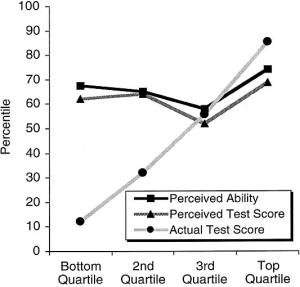We like clarity – defined as clearness or lucidity as to perception or understanding; freedom from indistinctness or ambiguity. So surely this is what we as educators should be aiming for. Brief succinct and to the point and our students are happy.
Confusion on the other hand is something unpleasant and to be avoided says conventional wisdom. This may be true for superficial tasks such as rote memorising, but there is mounting evidence that confusion promotes learning at a deeper level of comprehension.
Science is different than most subjects in that most students enter our classrooms with a preconceived notion of scientific concepts . Their minds are not a blank slate (sadly as that would be easier) but a mass of beliefs, many of which are wrong.
If we use the classic teaching idea of showing a demonstration and then having a discussion about what they have seen, that must be effective.
It would appear not, from research from Eric Mazur,the Harvard physics education researcher that we are better off not doing the demonstration at all unless you get them to predict an outcome first. If only the demo is viewed you tend to remember it in a way that confirms your belief rather than the reality. This is a common fallacy that we remember things as they really are. Making the prediction seems to force us to realise that we got it wrong and hence more likely to change our minds. The social discussion afterward seems to have no direct effect on their performance although longer term benefits were not evaluated. Nor was peer instruction used which would have been interesting.
Dr Derek Muller – with the youtube channel Veritasium exploits this improved performance with his videos that deliberately confuse Great Youtube Channel
Students prefer not to be confused and far prefer teachers who give clear explanations, . Is this always a good thing? Mazur tried an on-line test on several topics, where he asked students a couple of hard questions (novel situations, things they hadn’t faced previously), and then a meta-question, “Did you know what you were doing on those questions?” Mazur and his colleagues then coded that last question for “confusion” or “no confusion,” and compared that to performance on the first two problems.
Again the results are counter intuitive. The confused students actually perform way better than the ones who are not. Which probably means that the students who are happiest with their teachers are the poorer performers – (this has huge ramifications for fee paying schools who want their teachers to be popular )
For teachers we may be faced with the choice of being popular and ineffective, or unpopular and effective!
Not only are students poor at judging how effective their teachers are they also according to Mazur are very poor at predicting their own performance.
This could be partly down to the Dunning-Kruger effect where people have a tendency to overrate their own ability. This is usually down to ignorance rather than arrogance. In virtually every survey done more than 50% of people judge themselves as being better than average attractiveness, intelligence and ability as a driver. Perversely the least competent are the ones most likely to overrate themselves and the highest performers underrate themselves.
An article here outlines Dunning – Kruger effect and there’s a detailed blog here
Add all these things together and you can have very popular poor performing teachers who think they are great as they lack the analytical skills to see their failings and unpopular, but high performing teachers who beat themselves up. It can be a cruel, unfair world!
I will be launching a new YouTube Channel to support this so please watch this space



